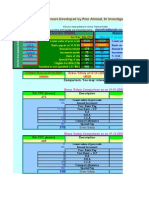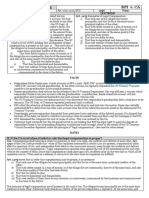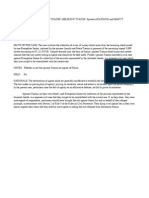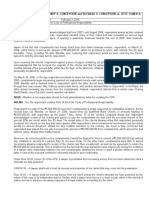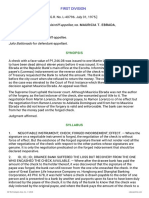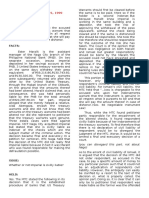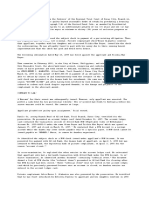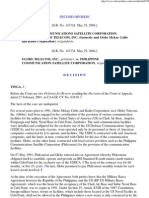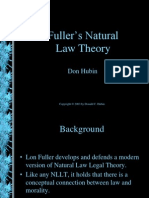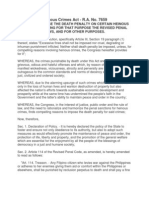BPI Vs Ca
BPI Vs Ca
Uploaded by
gianfranco0613Copyright:
Available Formats
BPI Vs Ca
BPI Vs Ca
Uploaded by
gianfranco0613Original Description:
Original Title
Copyright
Available Formats
Share this document
Did you find this document useful?
Is this content inappropriate?
Copyright:
Available Formats
BPI Vs Ca
BPI Vs Ca
Uploaded by
gianfranco0613Copyright:
Available Formats
G.R. No. 116792 March 29, 1996 BANK OF THE PHILIPPINES ISLAND and GRACE ROMERO, petitioners, vs.
COURT OF APPEALS and EDVIN F. REYES, respondents. FACTS: On September 25, 1985, private respondent Edvin F. Reyes opened Savings Account No. 31850172-56 at petitioner Bank of the Philippine Islands (BPI) Cubao, Shopping Center Branch. It is a joint "AND/OR" account with his wife, Sonia S. Reyes. Private respondent also held a joint "AND/OR" Savings Account No. 3185-0128-82 with his grandmother, Emeteria M. Fernandez, opened on February 11, 1986 at the same BPI branch. He regularly deposited in this account the U.S. Treasury Warrants payable to the order of Emeteria M. Fernandez as her monthly pension. Emeteria M. Fernandez died on December 28, 1989 without the knowledge of the U.S. Treasury Department. She was still sent U.S. Treasury Warrant No. 21667302 dated January 1, 1990 in the amount of U.S. $377.00 3 or P10,556.00. On January 4, 1990, private respondent deposited the said U.S. treasury check of Fernandez in Savings Account No. 3185-0128-82. The U.S. Veterans Administration Office in Manila conditionally cleared the check. The check was then sent to the United States for further clearing. Two months after or on March 8, 1990, private respondent closed Savings Account No. 31850128-82 and transferred its funds amounting to P13,112.91 to Savings Account No. 3185-017256, the joint account with his wife. On January 16, 1991, U.S. Treasury Warrant No. 21667302 was dishonored as it was discovered that Fernandez died three (3) days prior to its issuance. The U.S. Department of Treasury requested petitioner bank for a refund. For the first time petitioner bank came to know of the death of Fernandez. On February 19, 1991, private-respondent received a PT&T urgent telegram from petitioner bank requesting him to contact Manager Grace S. Romero or Assistant Manager Carmen Bernardo. When he called up the bank, he was informed that the treasury check was the subject of a claim by Citibank NA, correspondent of petitioner bank. He assured petitioners that he would drop by the bank to look into the matter. He also verbally authorized them to debit from his other joint account the amount stated in the dishonored U.S. Treasury Warrant. On the same day, petitioner bank debited the amount of P10,556.00 from private respondent's Savings Account No. 3185-0172-56. On February 21, 1991, private respondent with his lawyer Humphrey Tumaneng visited the petitioner bank and the refund documents were shown to them. Surprisingly, private respondent demanded from petitioner bank restitution of the debited amount. He claimed that because of the debit, he failed to withdraw his money when he needed them. He then filed a suit for Damages against petitioners before the Regional Trial Court of Quezon City, Branch 79. Petitioners contested the complaint and counter claimed, for moral and exemplary damages. By way of Special and Affirmative Defense, they averred that private respondent gave them his express verbal authorization to debit the questioned amount. They claimed that private respondent later refused to execute a written authority. In a Decision dated January 20, 1993, the trial court dismissed the complaint of private respondent for lack of cause of action. Private respondent appealed to the respondent Court of Appeals. However, the respondent Court reversed the impugned decision.
ISSUE: Whether or not legal compensation is proper. HELD: YES. Compensation shall take place when two persons, in their own right, are creditors and debtors of each other. Article 1290 of the Civil Code provides that "when all the requisites mentioned in Article 1279 are present,compensation takes effect by operation of law, and extinguishes both debts to the concurrent amount, even though the creditors and debtors are not aware of the compensation." Legal compensation operates even against the will of the interested parties and even without the consent of them. Since this compensation takes place ipso jure, its effects arise on the very day on which all its requisites concur. When used as a defense, it retroacts to the date when its requisites are fulfilled. Article 1279 states that in order that compensation may be proper, it is necessary: (1) That each one of the obligors be bound principally, and that he be at the same time a principal creditor of the other; (2) That both debts consist in a sum of money, or if the things due are consumable, they be of the same kind, and also of the same quality if the latter has been stated; (3) That the two debts be due; (4) That they be liquidated and demandable; (5) That over neither of them there be any retention or controversy, commenced by third persons and communicated in due time to the debtor. The elements of legal compensation are all present in the case at bar. The obligors bound principally are at the same time creditors of each other. Petitioner bank stands as a debtor of the private respondent, a depositor. At the same time, said bank is the creditor of the private respondent with respect to the dishonored U.S. Treasury Warrant which the latter illegally transferred to his joint account. The debts involved consist of a sum of money. They are due, liquidated, and demandable. They are not claimed by a third person. It is true that the joint account of private respondent and his wife was debited in the case at bar. We hold that the presence of private respondent's wife does not negate the element of mutuality of parties, i.e., that they must be creditors and debtors of each other in their own right. The wife of private respondent is not a party in the case at bar. She never asserted any right to the debited U.S. Treasury Warrant. Indeed, the right of the petitioner bank to make the debit is clear and cannot be doubted. To frustrate the application of legal compensation on the ground that the parties are not all mutually obligated would result in unjust enrichment on the part of the private respondent and his wife who herself out of honesty has not objected to the debit. The rule as to mutuality is strictly applied at law. But not in equity, where to allow the same would defeat a clear right or permit irremediable injustice.
You might also like
- Motions, Affidavits, Answers, and Commercial Liens - The Book of Effective Sample DocumentsFrom EverandMotions, Affidavits, Answers, and Commercial Liens - The Book of Effective Sample DocumentsRating: 4.5 out of 5 stars4.5/5 (17)
- 6th Central Pay Commission Salary CalculatorDocument15 pages6th Central Pay Commission Salary Calculatorrakhonde100% (436)
- Evidence (Complete) LAKAS ATENISTADocument341 pagesEvidence (Complete) LAKAS ATENISTAKiks Jampas100% (4)
- Urgent Motion Bail - Pending Raffle FormatDocument3 pagesUrgent Motion Bail - Pending Raffle FormatjelabercasioNo ratings yet
- Form of Petition For Restitution of Conjugal Rights Under Section 9 of The Hindu Marriage Act 1955Document2 pagesForm of Petition For Restitution of Conjugal Rights Under Section 9 of The Hindu Marriage Act 1955akashnagarNo ratings yet
- Iec 60230Document16 pagesIec 60230degetaNo ratings yet
- Tanduay Distillers Vs Ginebra San MiguelDocument2 pagesTanduay Distillers Vs Ginebra San MiguelTeff Quibod100% (3)
- Case SummaryDocument4 pagesCase SummaryApril Rose CorralNo ratings yet
- BPI v. Court of Appeals 255 SCRA 571 G.R. No. 116792 March 29 1996Document2 pagesBPI v. Court of Appeals 255 SCRA 571 G.R. No. 116792 March 29 1996Hurjae Soriano Lubag100% (4)
- Bank of The Philippine Islands and Grace Romero, Petitioners, vs. Court of Appeals and Edvin F. REYES, Respondents. DecisionDocument5 pagesBank of The Philippine Islands and Grace Romero, Petitioners, vs. Court of Appeals and Edvin F. REYES, Respondents. DecisionGedan TanNo ratings yet
- BPI Vs CA and ReyesDocument2 pagesBPI Vs CA and ReyesErnie GultianoNo ratings yet
- BPI vs. Reyes, 255 SCRA 571 (1996)Document2 pagesBPI vs. Reyes, 255 SCRA 571 (1996)Princess Jonas100% (2)
- BPI vs. CA GR 116792Document10 pagesBPI vs. CA GR 116792rowela jane paanoNo ratings yet
- BPI vs. Reyes G.R. No. 116792 March 29, 1996Document3 pagesBPI vs. Reyes G.R. No. 116792 March 29, 1996Teoti Navarro Reyes50% (2)
- Bank of The Philippine Islands v. Court of Appeals GR No. 116792, March 29, 1996 Ponente: Puno, J. FactsDocument1 pageBank of The Philippine Islands v. Court of Appeals GR No. 116792, March 29, 1996 Ponente: Puno, J. Factsnadgb100% (1)
- BPI Vs ReyesDocument2 pagesBPI Vs ReyesSJ San Juan50% (2)
- I. Complete Case Title: Bank of The Philippines Island and GraceDocument2 pagesI. Complete Case Title: Bank of The Philippines Island and GraceEspinagloryNo ratings yet
- LAWDocument2 pagesLAWEspinagloryNo ratings yet
- 087 BPI v. CA CompensationDocument2 pages087 BPI v. CA CompensationCarl AngeloNo ratings yet
- Osmena JalandoniDocument4 pagesOsmena JalandoniGIGI KHONo ratings yet
- BPI v. Reyes (1996)Document10 pagesBPI v. Reyes (1996)Michelle SulitNo ratings yet
- Rodzssen Supply Co. Inc., Petitioner, vs. Far East Bank & Trust CO., RespondentDocument4 pagesRodzssen Supply Co. Inc., Petitioner, vs. Far East Bank & Trust CO., Respondentrodrigo manluctaoNo ratings yet
- Law Cases - NegoDocument8 pagesLaw Cases - NegoMariann Jane GanNo ratings yet
- Imperial Insurance, Inc. vs. David: VOL. 133, NOVEMBER 21, 1984 317Document4 pagesImperial Insurance, Inc. vs. David: VOL. 133, NOVEMBER 21, 1984 317CherNo ratings yet
- PFR Case Digests Spouses Carbonell V Metropolitan Bank To Yon Mitori International Industries v. Union BankDocument24 pagesPFR Case Digests Spouses Carbonell V Metropolitan Bank To Yon Mitori International Industries v. Union BankPaul Ni�o DechosNo ratings yet
- 085 - BPI v. ReyesDocument2 pages085 - BPI v. ReyesCarl AngeloNo ratings yet
- Bank of The Philippine Islands VsDocument8 pagesBank of The Philippine Islands VsChris Dianne Miniano SanchezNo ratings yet
- Consolidated Agency Case DigestDocument41 pagesConsolidated Agency Case DigestArchie AgustinNo ratings yet
- CasesDocument24 pagesCasesMelanie Graile TumaydanNo ratings yet
- OBEJERA Vs Iga SyDocument9 pagesOBEJERA Vs Iga SyKeyan MotolNo ratings yet
- PNB V Maza FullDocument2 pagesPNB V Maza FullGlo Allen CruzNo ratings yet
- G.R. No. 96727 August 28, 1996 Rizal Surety & Insurance Company vs. Court of Appeals and Transocean Transport CorporationDocument13 pagesG.R. No. 96727 August 28, 1996 Rizal Surety & Insurance Company vs. Court of Appeals and Transocean Transport CorporationGodfrey Saint-OmerNo ratings yet
- Inter Office Legal MemoDocument5 pagesInter Office Legal MemoJameil De los Reyes100% (1)
- Plaintiff-Appellee Vs Vs Defendant-Appellant Sabino de Leon, Jr. Julio BaldonadoDocument7 pagesPlaintiff-Appellee Vs Vs Defendant-Appellant Sabino de Leon, Jr. Julio BaldonadoAndrei Anne PalomarNo ratings yet
- ENGRACIO FRANCIA, Petitioner, Intermediate Appellate Court and Ho Fernandez, Respondents. FactsDocument30 pagesENGRACIO FRANCIA, Petitioner, Intermediate Appellate Court and Ho Fernandez, Respondents. Factslou017No ratings yet
- atp CASESDocument97 pagesatp CASESfranklingardocevillaNo ratings yet
- Sps. Concepcion vs. Atty Elmer Dela Rosa - CPR - Rule 16.04Document2 pagesSps. Concepcion vs. Atty Elmer Dela Rosa - CPR - Rule 16.04Franchette Kaye Lim0% (1)
- United States v. Second National Bank of North Miami, 502 F.2d 535, 2d Cir. (1974)Document20 pagesUnited States v. Second National Bank of North Miami, 502 F.2d 535, 2d Cir. (1974)Scribd Government DocsNo ratings yet
- BPI vs. IntermeDocument5 pagesBPI vs. IntermenbragasNo ratings yet
- Oblicon Case Digest 8Document19 pagesOblicon Case Digest 8LAWRENCE EDWARD SORIANONo ratings yet
- Republic vs. EbradaDocument4 pagesRepublic vs. Ebradamia_2109No ratings yet
- Petitioner vs. vs. Respondents Francis M. Zosa Bayani L. CalonzoDocument8 pagesPetitioner vs. vs. Respondents Francis M. Zosa Bayani L. CalonzoFrancisCarloL.FlameñoNo ratings yet
- Plaintiff-Appellee Vs Vs Defendant-Appellant Sabino de Leon, Jr. Julio BaldonadoDocument7 pagesPlaintiff-Appellee Vs Vs Defendant-Appellant Sabino de Leon, Jr. Julio BaldonadoAira PatricioNo ratings yet
- 1975-Republic Bank v. EbradaDocument7 pages1975-Republic Bank v. EbradaKathleen MartinNo ratings yet
- Petitioner Vs Vs Respondents Domingo & Dizon Mauricio Law OfficeDocument11 pagesPetitioner Vs Vs Respondents Domingo & Dizon Mauricio Law OfficeLDCNo ratings yet
- Guingona Vs City Fiscal of ManilaDocument2 pagesGuingona Vs City Fiscal of Manilaryan kintanarNo ratings yet
- Republic Bank VS EbradaDocument2 pagesRepublic Bank VS EbradaaxvxxnNo ratings yet
- Article 1279-1280Document51 pagesArticle 1279-1280RinielNo ratings yet
- Fiduciary 1 6Document6 pagesFiduciary 1 6TNVTRLNo ratings yet
- Credit Transactions - DigestsDocument8 pagesCredit Transactions - DigestsJoan NarvaezNo ratings yet
- Nego Digests 32 - 34Document4 pagesNego Digests 32 - 34Cla BANo ratings yet
- 1926-Philippine National Bank v. MazaDocument3 pages1926-Philippine National Bank v. MazaKathleen MartinNo ratings yet
- People Vs ReyesDocument6 pagesPeople Vs ReyesEj AquinoNo ratings yet
- Guingona, Jr. vs. City Fiscal of ManilaDocument10 pagesGuingona, Jr. vs. City Fiscal of Manila유니스No ratings yet
- Gullas V PNBDocument4 pagesGullas V PNBJoyce KevienNo ratings yet
- 05 Gullas v. PNBDocument3 pages05 Gullas v. PNBGene Charles MagistradoNo ratings yet
- 1989 Yang - v. - Valdez20210427 11 1dpxn2qDocument9 pages1989 Yang - v. - Valdez20210427 11 1dpxn2qJohn HamoyNo ratings yet
- Pugeda - Case Digest 1Document4 pagesPugeda - Case Digest 1Horcrux RomeNo ratings yet
- Negotiable Instruments Case DigestDocument88 pagesNegotiable Instruments Case DigestJohn Lester LantinNo ratings yet
- Guingona Jr. Vs Fiscal of Manila GR No. L-60033 Makasar, J. FactsDocument6 pagesGuingona Jr. Vs Fiscal of Manila GR No. L-60033 Makasar, J. FactsKhristin AllisonNo ratings yet
- Guingona Vs City Fiscal of ManilaDocument4 pagesGuingona Vs City Fiscal of ManilaLouNo ratings yet
- Oblicon - BPI Vs CA, REYESDocument1 pageOblicon - BPI Vs CA, REYESChi KoyNo ratings yet
- Digest 3Document24 pagesDigest 3Kathlene JaoNo ratings yet
- Palmares Vs CADocument2 pagesPalmares Vs CAPam RamosNo ratings yet
- U.S. v. Sun Myung Moon 532 F.Supp. 1360 (1982)From EverandU.S. v. Sun Myung Moon 532 F.Supp. 1360 (1982)No ratings yet
- Joint Doh-Dti-Ipo-Bfad Administrative Order No. 2008-01Document66 pagesJoint Doh-Dti-Ipo-Bfad Administrative Order No. 2008-01gianfranco0613No ratings yet
- Tenant AgreementDocument6 pagesTenant Agreementgianfranco0613No ratings yet
- Title Date Filename: (Rules of Court)Document5 pagesTitle Date Filename: (Rules of Court)gianfranco0613No ratings yet
- A Corporate Secretary DutiesDocument1 pageA Corporate Secretary Dutiesgianfranco0613No ratings yet
- Stories in The CourtDocument124 pagesStories in The Courtgianfranco06130% (1)
- Partnership and CorporationDocument3 pagesPartnership and Corporationgianfranco0613No ratings yet
- NHA vs. AlmeidaDocument3 pagesNHA vs. Almeidagianfranco0613100% (1)
- Antolin Vs DomondonDocument3 pagesAntolin Vs Domondongianfranco0613100% (1)
- Jalosjos vs. ComelecDocument3 pagesJalosjos vs. Comelecgianfranco0613100% (1)
- Boy Scouts of The Philippines Vs CADocument1 pageBoy Scouts of The Philippines Vs CAgianfranco0613No ratings yet
- Los Angeles County Vs RetteleDocument1 pageLos Angeles County Vs Rettelegianfranco0613No ratings yet
- Canlas vs. Napico HomeownersDocument1 pageCanlas vs. Napico Homeownersgianfranco0613No ratings yet
- Razon JR vs. TagitisDocument6 pagesRazon JR vs. Tagitisgianfranco0613100% (1)
- Pleasant Grove City Vs SummumDocument2 pagesPleasant Grove City Vs Summumgianfranco0613No ratings yet
- Razon JR vs. TagitisDocument6 pagesRazon JR vs. Tagitisgianfranco0613100% (1)
- Limkaichong vs. ComelecDocument4 pagesLimkaichong vs. Comelecgianfranco0613100% (1)
- Vda de Ouano Vs RepublicDocument3 pagesVda de Ouano Vs Republicgianfranco0613100% (1)
- Manotok Vs CLTDocument2 pagesManotok Vs CLTgianfranco0613100% (1)
- Philippine Communication vs. Globe TelecomDocument11 pagesPhilippine Communication vs. Globe Telecomgianfranco0613100% (1)
- SWS Vs AsuncionDocument1 pageSWS Vs Asunciongianfranco06130% (1)
- Los Angeles County Vs RetteleDocument1 pageLos Angeles County Vs Rettelegianfranco0613No ratings yet
- Canlas vs. Napico HomeownersDocument1 pageCanlas vs. Napico Homeownersgianfranco0613No ratings yet
- Kyllo Vs United StatesDocument2 pagesKyllo Vs United Statesgianfranco0613No ratings yet
- Barzaga vs. Court of AppealsDocument7 pagesBarzaga vs. Court of Appealsgianfranco0613No ratings yet
- No. 03-010Document4 pagesNo. 03-010gianfranco0613No ratings yet
- Bachelor Express vs. Court of AppealsDocument9 pagesBachelor Express vs. Court of Appealsgianfranco0613No ratings yet
- Vat Registration in KeralaDocument2 pagesVat Registration in Keralascribd5378No ratings yet
- 01 CRIM PRO Rule 112 Rodis V SandiganbayanDocument2 pages01 CRIM PRO Rule 112 Rodis V SandiganbayanKevin Ken Sison Ganchero100% (1)
- Alcantara v. BelenDocument2 pagesAlcantara v. BelenGailRoseAnneEgar100% (1)
- Abstract of Minimum WagesDocument6 pagesAbstract of Minimum WagesAkhil JamesNo ratings yet
- Syllabus in Civil Procedure - CasesassignedDocument8 pagesSyllabus in Civil Procedure - CasesassignedstephclloNo ratings yet
- Case Digests 8-19-30-41Document9 pagesCase Digests 8-19-30-41Ronna Faith MonzonNo ratings yet
- RRACCS ProcedureDocument6 pagesRRACCS ProcedureMark VernonNo ratings yet
- Fuller's Natural Law TheoryDocument19 pagesFuller's Natural Law TheoryHeidi Hamza67% (3)
- Bulk SalesDocument2 pagesBulk SalesCris AnonuevoNo ratings yet
- Maloney-Crawford Tank Corporation and The Fish Investment Corporation v. Sauder Tank Company, Inc., 511 F.2d 10, 10th Cir. (1975)Document6 pagesMaloney-Crawford Tank Corporation and The Fish Investment Corporation v. Sauder Tank Company, Inc., 511 F.2d 10, 10th Cir. (1975)Scribd Government DocsNo ratings yet
- Constitution Statutes Executive Issuances Judicial Issuances Other Issuances Jurisprudence International Legal Resources AUSL ExclusiveDocument6 pagesConstitution Statutes Executive Issuances Judicial Issuances Other Issuances Jurisprudence International Legal Resources AUSL Exclusiveian benNo ratings yet
- Landl & Co. V. Metrobank G.R. No. 159622 July 30, 2004 FactsDocument3 pagesLandl & Co. V. Metrobank G.R. No. 159622 July 30, 2004 FactsJose MasarateNo ratings yet
- Deed of Donation FormatDocument2 pagesDeed of Donation FormatLejoe CamposNo ratings yet
- Lampesa v. de VeraDocument10 pagesLampesa v. de VeramisterdodiNo ratings yet
- 23 CPT LawDocument132 pages23 CPT LawANo ratings yet
- Civil Procedure - Receivership PDFDocument3 pagesCivil Procedure - Receivership PDFRommel P. AbasNo ratings yet
- Teresita Suson and Antonio Fortich Vs People of The Philippines GR NO. 152848 July 12, 2006Document7 pagesTeresita Suson and Antonio Fortich Vs People of The Philippines GR NO. 152848 July 12, 2006Francis V MartinezNo ratings yet
- Nakpil Vs Atty UyDocument3 pagesNakpil Vs Atty Uyjimmie alforqueNo ratings yet
- Us v. Ang Tang HoDocument1 pageUs v. Ang Tang HoRNicolo Ballesteros100% (1)
- Heinous Crimes ActDocument35 pagesHeinous Crimes ActAnonymous isdp4VNo ratings yet
- Federal LawsuitDocument41 pagesFederal Lawsuitapi-309342360No ratings yet
- Position PaperDocument6 pagesPosition PaperJhudith De Julio Buhay0% (1)
- Robinson's Galleria Vs SanchezDocument9 pagesRobinson's Galleria Vs SanchezChristelle Ayn BaldosNo ratings yet
- FDSFDSFDocument9 pagesFDSFDSFlividNo ratings yet

